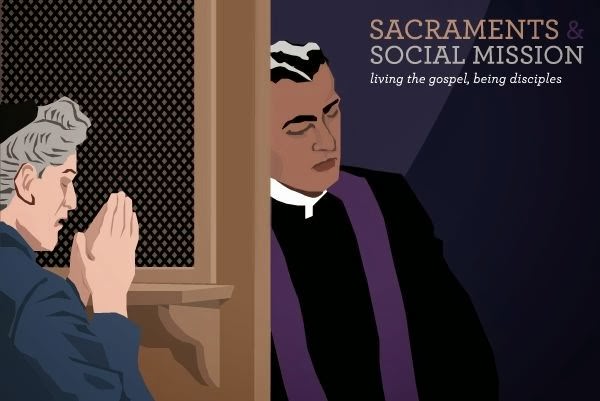Mission Monday: Reconciliation as Mission

Continuing our series Sacraments and Social Mission: Living the Gospel, Being Disciples, current missioner Valerie Ellis writes today about her faith’s relationship to the Sacrament of Reconciliation and her call to mission.
Every time I come out of confession, I feel completely cleansed and at peace. What a beautiful gift we have from God to go on living in a state of forgiveness and love! Reconciliation is a most joyous sacrament indeed.
I have to remember to be at peace with myself and with others in order to share God’s love. For me, this has meant forgiving wrongs and continually seeking out a right relationship with God. In order to have a right relationship with God, He calls us to forgive others as we would like to be forgiven. When I reflect on the hurts in my life, I am shocked and sad to see a parallel with how I sometimes treat God.
Although I have high expectations for those in my life to avoid making the same offenses over and over, I only have to look to my personal confession to see how it hurts God when I do the same. This also allows me to have compassion for others and to remember that we are all human beings who deserve second chances. After all, our forgiving is only a small fraction of the second chances that God gives us through His unconditional love.
On a broader sense, the call to reconciliation is a call to forgive all hurts, from one individual to another, from one region to another, and from one country to another. I hope that through my individual call to mission, I can help individuals, specifically the children with whom I work, see that they really matter and that their lives have a universal purpose.
In addition, I truly believe that all wrongs stem from a lack of communication and trust, and I am optimistic that every opportunity we have to reach out to others (where our countries may not always see eye to eye) may serve as a salve to mend open wounds.
There may be many things that could prevent someone from seeing the sacrament of reconciliation as a call to mission. Perhaps, like many of us, we have not practiced reconciliation as a normal part of our daily lives, and therefore, it is hard to even grasp the possibility of reconciliation. Or perhaps there are deep seated feelings of hurt, even passed down from generations, about those in situations unlike ours.
From these vantage points and everywhere in between, I would encourage those who may be struggling to first grant themselves forgiveness and peace, and then to extend it to others. This is not a process that will happen overnight, but forgiveness can be extremely freeing and healing.
I believe there are two requirements necessary for someone to serve as a peacemaker:
- To take one step at a time. With each positive move toward change, the next step becomes easier.
- To pray unceasingly. This advice was given to me in confession by a priest, and I believe it was some of the best advice I have ever been given.
Tagged in:
